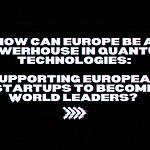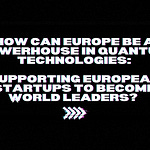As we welcome 2024, let's reflect on the critical developments in scientific research and innovation shaped by geopolitical dynamics over the past year. This pod and article delve into the shifting landscape of international collaboration, emphasizing the roles of major global players and innovative breakthroughs in energy, space technologies, and generative AI.
We'll explore how these advancements are influencing our sustainable future and expanding our cosmic understanding. Additionally, we examine the burgeoning world of AI, where rapid growth brings both opportunities and challenges in regulation and industry adaptation.
A special focus is given to the evolving dynamics of startup ownership and control, illustrated by Open AI's public board deliberations. This case study highlights the complex balance of power among founders, teams, investors, and boards in guiding the future of pioneering companies.
As we step into the new year, let's navigate these changes with insight and integrity, both professionally and personally. Here's to a year of positive impact and innovation. We hope you enjoy this write up and tune in to hear the expanded conversation between Chris and David on Spotify or Apple below 🎧
The Impact of Geopolitics on Global Scientific Collaboration and the Emergence of Defense Funds
In the realm of scientific research and innovation, international collaboration has always been a cornerstone. Pre-COVID, we witnessed a surge in international cooperation among European countries and the United States. This trend persisted, with a notable 25% of all scientific papers now boasting authors from multiple countries. However, China has charted a different course.
China's increasing prominence in global science is undeniable. Tsinghua University, for example, outpaces top U.S. technical universities in producing high-criterion papers. In 2021, China contributed to 46% of global scientific publications, a stark contrast to the UK's 12%. This disparity highlights a broader narrative: the weaponization of science and technology in geopolitics. Notable instances like the U.S. government blocking Nvidia's acquisition of Arm due to concerns over ARM's China business underscore this trend.
Simultaneously, other regions are experiencing shifts in their scientific landscapes. Korea and Japan, for instance, are seeing their venture ecosystems flourish, aided by improving political dynamics between the two nations. In contrast, China's participation in international scientific endeavors seems more restrained.
In a positive turn, the UK has rejoined the €95 billion Horizon Program, a move that promises significant benefits for UK startups in terms of funding, new projects, and accelerators. This reintegration is a beacon of hope for fostering international scientific cooperation and innovation.
2023 has also been a landmark year for recognitions in science and technology. The prestigious Breakthrough Prizes, awarded by tech luminaries like Sergey Brin, Priscilla Chan, and Mark Zuckerberg, have honored individuals from the United States, Britain, France, and Japan, showcasing the diverse contributions to the scientific community.
Moreover, NATO's launch of its Innovation Fund in 2023 is a pivotal development. With a budget of €1 billion and managed by experienced venture capital executives, this fund aims to "supercharge" science, technology, engineering, and math (STEM) initiatives. It represents a significant investment in bolstering scientific research and development, especially in fields relevant to defense and security. This initiative is particularly beneficial for dual-use startups, bridging the gap between civilian and military applications of technology.
In summary, while geopolitical dynamics continue to shape the landscape of global scientific collaboration, initiatives like NATO's Innovation Fund and the UK's re-engagement with the Horizon Program offer promising avenues for fostering international cooperation and innovation. These developments highlight the intricate interplay between politics, science, and industry, shaping the future of global scientific endeavor.
Advances in Energy and Space Technologies
Energy Breakthroughs: Fusion, Organic Films, and European Innovations
The past year has been revolutionary for energy technologies. The Lawrence Livermore National Laboratory's National Ignition Facility achieved a groundbreaking nuclear fusion event, producing more energy than was consumed in the reaction. This achievement, replicated on July 23 with improved energy yield, fuels the hope for limitless green energy. As a result, investment in nuclear fusion companies has doubled, totaling $2 billion.
In another significant development, researchers have made a breakthrough in creating organic films capable of converting indoor light into electrical energy. This innovation holds the potential for powering low-energy devices, marking a significant step forward in sustainable energy solutions.
European startups have not been left behind, making strides in new nuclear fission technologies and exploring nanotechnologies for generating energy from water. These advancements underscore Europe's growing role in the global energy sector.
The New Space Race and Extraordinary Discoveries
The modern-day adage for explorers could well be "Go to the Heavens," with over 77 countries now boasting space agencies. The space race, once a two-player game between Russia and the U.S., has evolved into a global competition, with China taking a prominent role.
The James Webb Telescope, celebrating its first anniversary in orbit, has been a fountain of knowledge. In just a year, it has facilitated the creation of 750 scientific publications. Its observations of distant galaxies are challenging our understanding of the universe's formation.
A notable achievement of the telescope was the detection of an exoplanet 41 light years away, a distance of over 2 quadrillion miles. This discovery opens up new possibilities in our quest to understand the universe and find potentially habitable worlds.
European startups are making their mark in space technologies, particularly in the detection and management of space debris. Their efforts in avoiding collisions and removing debris are critical for maintaining the safety and sustainability of space operations. Additionally, new rocket engines designed for low earth orbit satellites are being developed, enhancing the capabilities of space exploration and utilization.
Collaborations between NASA and SpaceX, as well as the European Space Agency's (ESA) engagement with European companies, highlight the growing synergy between governmental space agencies and the private sector. These partnerships are vital in advancing space exploration and technology, demonstrating a robust and collaborative approach to conquering the final frontier.
In summary, the past year has witnessed significant advancements in energy and space technologies, from nuclear fusion breakthroughs to pioneering space explorations. These developments not only pave the way for a more sustainable future on Earth but also propel humanity further into the mysteries of space.
The Transformative Impact of Generative AI
Breakthroughs in Material Science and Beyond
DeepMind's recent announcement marks a monumental shift in the field of material science. Their AI has predicted the structure of over 2 million new materials, a process that could revolutionize how we develop crucial technologies. For perspective, it took over 15 years to develop the structure of the lithium battery. With AI, similar achievements could be accomplished in mere months, dramatically accelerating innovation.
2023: The Year of Generative AI
Generative AI, especially in the form of ChatGPT, has defined 2023. While supercomputers and vast data are not new, the accessibility and efficiency brought by ChatGPT's robotic processes are revolutionary. Here are some of the key areas impacted:
Content Creation: ChatGPT leverages its extensive knowledge base to offer novel perspectives and aid in research. However, it still requires human editorial oversight.
Customer Service in Various Sectors: In banking, healthcare, and retail, AI bots are transforming customer interactions. They comprehend complex, evolving queries, providing swift, cost-effective service.
Software Development: ChatGPT assists developers in understanding program logic and goals, and can even generate and correct code.
Challenges and Opportunities in Regulation and Business
With any groundbreaking technology come challenges, particularly in cybersecurity. The rapid advancement of AI has prompted significant government action on AI regulation. The UK government, recognizing the need for comprehensive dialogue, enlisted the help of the co-founder and CEO of Entrepreneur First to lead a global conference on the subject.
Generative AI presents vast opportunities for startups to forge new business models. The recent instability of OpenAI's systems has caused a stir, reflecting the disruptive nature of this technology. For established corporations, the race to keep up with AI innovations may spur a wave of mergers and acquisitions, providing lucrative opportunities for startups.
In summary, generative AI, especially in 2023, has emerged as a pivotal force in reshaping various industries. From accelerating material science research to transforming customer service and software development, its impact is profound. However, alongside these opportunities, the technology brings challenges, necessitating careful regulation and thoughtful integration into existing business models.
The Evolving Dynamics of Startup Ownership and Control
Startups: From Garages to the Mainstream
The landscape of startups has drastically evolved from their traditional image of garage-based ventures to becoming mainstream economic powerhouses. This shift is vividly illustrated by the intense media focus on the board dynamics of Open AI. The coverage of Open AI, especially in the context of Sam Altman's tumultuous tenure as CEO, arguably eclipsed the pre-IPO media attention received by giants like Google in 2004. This heightened interest is not only due to Open AI's groundbreaking work in AI but also because of the compelling narrative surrounding its leadership.
The Fundamental Question: "Whose Company Is It Anyway?"
The case of Open AI brings to the forefront a crucial question in the startup world: Who really owns and controls a company? Is it the founders, the team, the investors, or the board? Each plays a vital role:
Founders: They are the ones who conceive and give birth to the company, setting its initial vision and direction.
Team: Comprising individuals who build the company, often compensated with sweat equity, the team's role is integral to the company's growth and success.
Investors: They provide the necessary financial backing and, according to the capitalization table, may own a significant portion of the company. But does financial contribution equate to absolute ownership?
Board: Typically composed of founders and investors (though not in the case of Open AI), the board holds substantial influence over the company's strategic direction.
While the public nature of OpenAI's board deliberations was unusual and seemingly intended to sway outcomes, such dynamics are not uncommon in the startup world. They highlight the complex interplay between different stakeholders in determining a company's trajectory.
In summary, the case of Open AI exemplifies the shifting dynamics of startup ownership and control, yet so in a very public manner. It underscores the need to understand the intricate balance of power among founders, teams, investors, and boards in steering the future of innovative companies. This balance is especially critical in companies at the forefront of pioneering technologies, where decisions can have far-reaching implications.
With that in our minds, let’s journey into 2024 and show up in our boards, families and relations as best we can.
In the end, that’s all that’s in our power.
Have a very happy new year.
🥳














